TECHNOLOGY DOMAIN
Deeane Cordy
Technology Instructional Leader
Learning in the Technology Domain gives you the freedom to use your creativity to solve problems in a real-world context.
Technology is an increasingly significant part of our society, which is why it is important that we learn the appliances and systems people rely on daily in order to create a more efficient, safer and healthier world.
We foster an appreciation for traditional techniques, while also exploring the frenetic world of emerging technologies. Here, you have opportunities to analyse problems and implement a range of digital and design solutions such as artificial intelligence engines, engineering robots, building sustainable furniture and improving the quality and accessibility of food.
In this Domain you have the choice to explore technologies in the areas of; digital, fibre, food, materials and systems engineering.
Digital - 2D and 3D Game Design and Animation

- Create a fully playable 2D game and 3D game
- Create 3D models and 3D environments
- Design game levels and environments
Subject Code: P3TDG
Year Level: 9 or 10
What will I learn?
This unit will guide you through the entire game design process of creating both 2D and 3D games from scratch. Learn essential game development concepts, master industry-standard software tools. You will finish the course with two fully playable games.
What will I do?
- Come up with a game idea: Choose a theme, genre and target audience, gameplay mechanics, story, characters and visual style.
- Create and source 2D and 3D art assets, including characters, objects, backgrounds, and user interface elements.
- Programming gameplay elements and implement game logic such as character movement, collisions, scoring, and level progression, win and lose conditions, checkpoints, and difficulty scaling using a scripting language.
- Design levels and environments, place objects, obstacles, and enemies strategically. Create sound effects and background music to enhance the game's atmosphere and user experience
Where can this take me?
VCE Subjects: VET Creative Industries, VCE Applied Computing, VCE Media.
Careers/Jobs: Animator, game level designer, programmer/software developer, 2D and 3D game artist, 2D animator.
Duration:
1 semester.
Digital - Cybersecurity, Programming and Artificial Intelligence

- Introduction to cybersecurity, cyber threats and attacks, security concepts, digital hygiene and secure online practices.
- Programming Languages and their applications using hands on coding exercises and projects
- Artificial Intelligence, machine learning, real world applications, ethical considerations and future developments.
Subject Code: P3TDC
Year Level: 9 or 10
What will I learn?
- To identify common cyber threats, practice secure online habits, and understand encryption techniques and network security concepts.
- Gain proficiency in programming concepts and languages, enhance problem-solving and algorithmic thinking abilities, and experience collaborative coding projects.
- Understand and explore key AI concepts, real-world applications, and ethical implications, while discussing the impact of AI on society, its benefits, and limitations.
What will I do?
- Engage in cybersecurity challenges: Participate in activities like digital escape rooms, where you'll solve puzzles related to encryption, phishing, and password security.
- Collaborate on programming projects: Work together with peers to create shared projects, such as pixel art or interactive games, while developing teamwork and problem-solving skills.
- Explore AI applications and ethics: Dive into AI-generated content and storytelling, discuss real-world AI applications, and examine the benefits, limitations, and ethical implications of artificial intelligence.
Where can this take me?
VCE Subjects: VCE Applied Computing; VET Creative Industries, VCE Media.
Careers/Jobs: Cybersecurity analyst, software developer, data scientist, machine learning engineer, ethical hacker/penetration tester, AI researcher, IT consultant and AI art and design specialist.
Duration:
1 semester.
Fibre - Fabric Construction
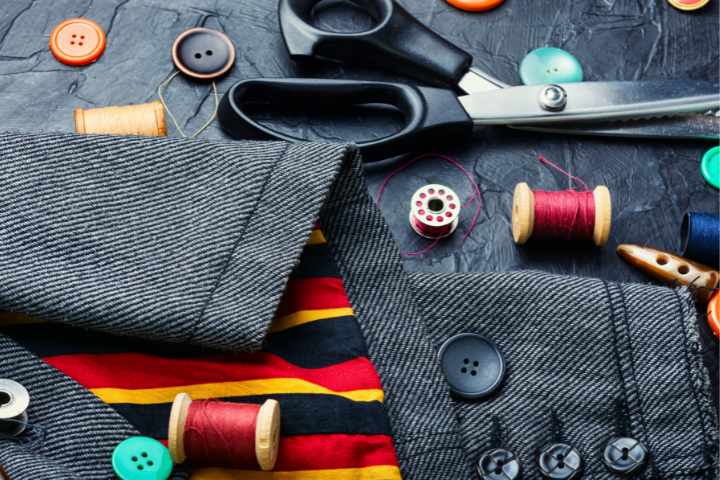
- Make items of clothing
- Learn about recycling clothes and the impacts of fast fashion
- Gain sewing skills on the sewing machine and by hand
Subject Code: P3TFF
Year Level: 9 or 10
What will I learn?
In Fabric construction, we are hands on! We research different uses of fibre and fabrics. There is a class focus on recycling garments and sustainable practices. You learn a wide range of sewing machine skills and how to follow a commercial pattern to make clothing. You will also learn fabric decoration techniques, including hand embroidery.
What will I do?
- Sew sample techniques on the machine in preparation for sewing an article of clothing
- Re-model an article of clothing using your own design and complete an assessment on sustainability in the fashion industry
- Complete a variety of fabric construction and decoration projects
Where can this take me?
Pathways subjects: Fibre: Textile Art.
VCE Subjects: VCE Production Design & Technology – Textiles, VCE Art Making & Exhibiting.
Careers/Jobs: Textile artist, fashion designer, costume designer, visual arts and crafts professional.
Duration:
1 semester.
Fibre - Textile Art
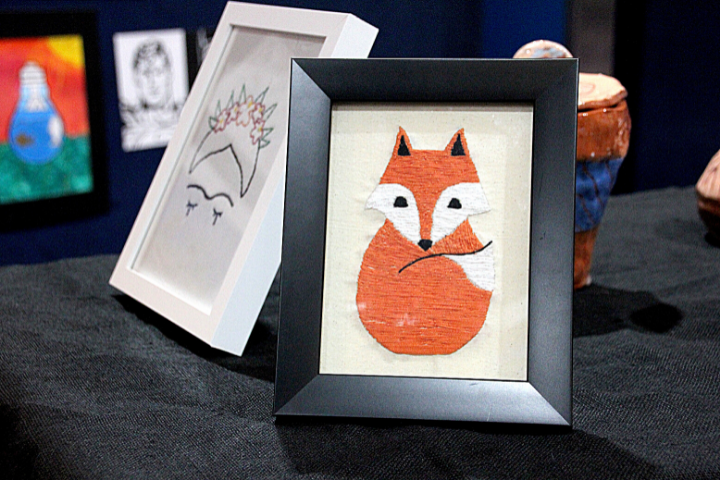
- Design and make functional items
- Learn dying techniques using a range of methods
- Decorate fabric using machine and hand stitching techniques
Subject Code: P3TFT
Year Level: 9 or 10
What will I learn?
You will learn how to manipulate fabric and other textile items using techniques such as felting, dying, painting, patchwork and stitching. You will design and produce a range of products using these techniques.
What will I do?
- Explore a range of fabric decorating techniques to make an item such as a tote or make up bag
- Make a wall hanging using different techniques and materials such as patchwork, fabric printing and hand embroidery
- Create your own design to produce an artwork by felting or silk painting
Where can this take me?
Pathways subjects: Fibre: Fabric Construction.
VCE Subjects: VCE Production Design & Technology – Textiles, VCE Art Making & Exhibiting.
Careers/Jobs: Textile artist, fashion designer, costume designer, visual arts and crafts professional.
Duration:
1 semester.
Food - Breakfast, Lunches and Dinners
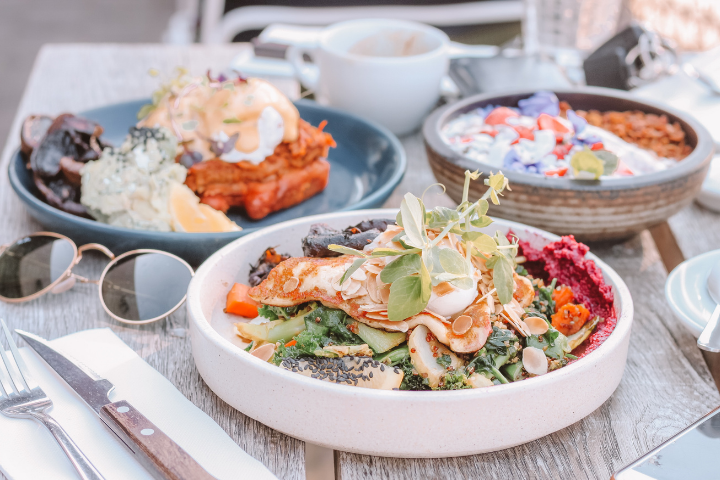
- Cook popular recipes
- Investigate the cost of food and sustainable food issues
- Discover food trends
Subject Code: P3TFB
Year Level: 9 or 10
What will I learn?
We produce recipes that are regularly found on your kitchen table and on menus, including our favourite breakfasts, home-baked sweet treats, lunches and dinners. You learn appropriate food handling and safety considerations, and practice industry standard food preparation methods. We consider environmental and ethical issues in food production.
What will I do?
- Two practical and one theory-based lesson per week
- Use a design brief to prepare a meal of choice - food trend
- Learn preservation methods for recipes such as jam, relish and dehydrated foods
Where can this take me?
Pathway subjects: Foods Around the World, Cafe Style, Cooking for Crowds.
VCE Subjects: VCE Food Studies, VET Hospitality.
Careers/Jobs: Hospitality, chef, food technologist, childcare coordinator, home economist, nutritionist.
Duration:
1 semester.
Food - Café Style
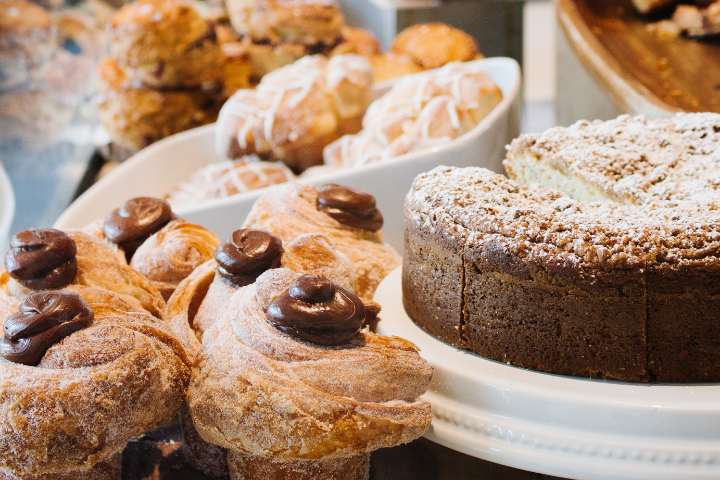
- Master café recipes
- Learn café service and etiquette
- Prepare café lunches to sell to staff and students
Subject Code: P3TFS
Year Level: 9 or 10
What will I learn?
We produce café-style recipes that are regularly found on a café menu, including our favourite main meals and desserts. You use appropriate food handling and safety considerations, and practice industry standard food preparation methods. You prepare a selection of café lunches that we sell to students and staff at our Café every week.
What will I do?
- Work in groups to prepare foods
- Cook and help run Café at school
- Design foods that would be suitable for customers with specific food allergies or intolerances
Where can this take me?
Pathways: Foods Around the World, Breakfast Lunches and Dinners, Cooking for Crowds.
VCE Subjects: VCE Food Studies, VET Hospitality.
Careers/Jobs: Hospitality, chef, food technologist, childcare coordinator, home economist, nutritionist.
Duration:
1 semester.
Food - Cooking for Crowds
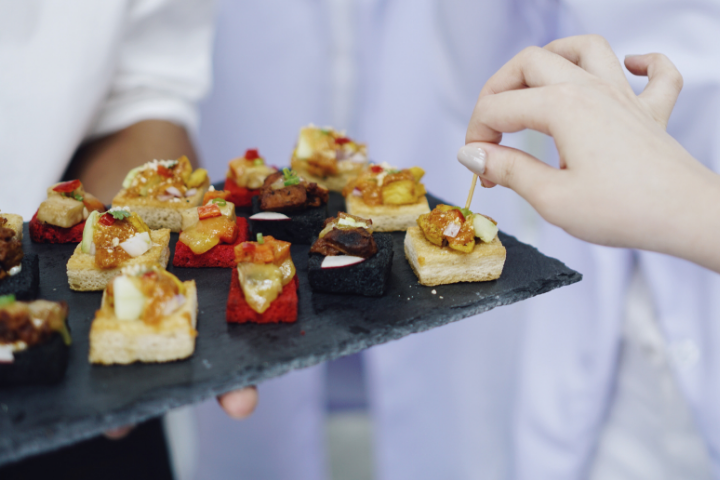
- Cater for groups and school functions
- Learn safe and hygienic food production methods
- Occasionally cook for Cafe snack and sweet menu
Subject Code: P3TFC
Year Level: 9 or 10
What will I learn?
We focus on cooking for larger numbers, which includes cooking for functions within the school. We study quantity calculation of ingredients and learn how to compile standard recipe cards. Emphasis is on practical work using safe and hygienic food production.
What will I do?
- Generally two practical and one theory-based lesson per week
- Work in groups to prepare food for functions
- Use of design brief to complete assessments including Cafe snack menu and cocktail food
Where can this take me?
Pathways: Foods Around the World, Breakfast Lunches and Dinners, Cafe Style.
VCE Subjects: VCE Food Studies, VET Hospitality.
Careers/Jobs: Hospitality, chef, food technologist, childcare coordinator, home economist, nutritionist.
Duration:
1 semester.
Food - Foods Around the World
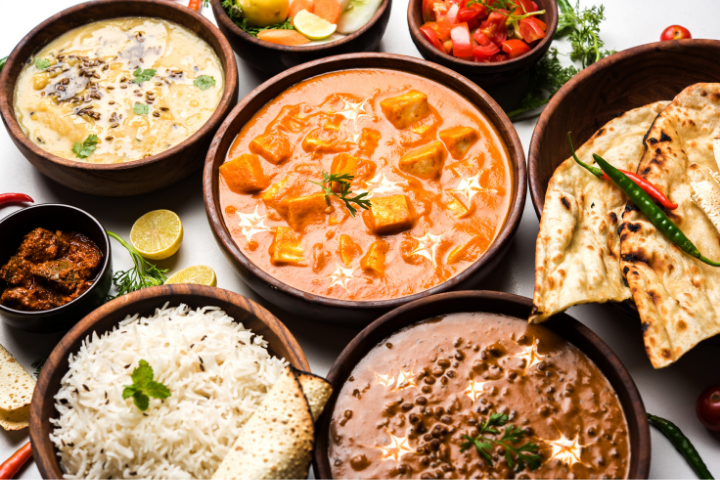
- Cook a variety of classic dishes from the Mediterranean, Asian and other locations across the globe
- Develop an understanding of Australian cuisine in its multicultural context
- Understand how social and geographical factors influence cuisines around the world
Subject Code: P3TFW
Year Level: 9 or 10
What will I learn?
We will explore and examine dishes and ingredients from around the world, investigating why these foods are unique to a specific region, both culturally and geographically. As such, there will be an exploration of the history of food and cuisines both globally, and on a national scale; we will explore indigenous foods and how waves of migration have influenced Australian fare, culminating in our exciting contemporary multicultural 'food fusions'. We will learn a variety of new cooking skills, terminology, how to plan and write food and time plans and how to 'cost out' recipes.
What will I do?
- Two practicals and one theory-based class per week
- Cook meals that contribute to Australia’s multicultural food scene
- Use a Design Brief to cook international cuisines - 'Food Truck Style' and those using a particular food staple
Where can this take me?
Pathways: Cooking for Crowds, Breakfast Lunches and Dinners, Cafe Style.
VCE Subjects: VCE Food Studies, VET Hospitality.
Careers/Jobs: Hospitality, chef, food technologist, childcare coordinator, home economist, nutritionist.
Duration:
1 semester.
Introduction to Building and Construction
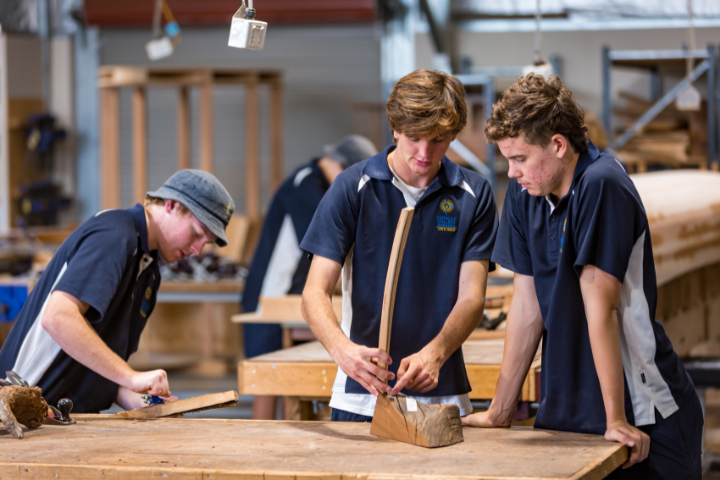
- Learn what it’s like to be a builder / carpenter
- Build a house wall frame
- Design and construct a timber project out of recycled timber
Subject Code: P3TBC
Year Level: 9 or 10
What will I learn?
This is an introduction to the Building and Construction Industry. You gain an appreciation for what it is like to work ‘on the tools’. You develop an understanding of, and experience in, the safe and correct use of carpentry hand tools.
What will I do?
- Learn how to use a wide range of carpentry tools
- Build a wall frame
- Use your practical know-how to build a project out of timber
Where can this take me?
VCE Subjects: VET Building & Construction, VCE Product Design & Technology.
Careers/Jobs: Builder/carpenter.
Duration:
1 semester.
Metal - Alloy Steel
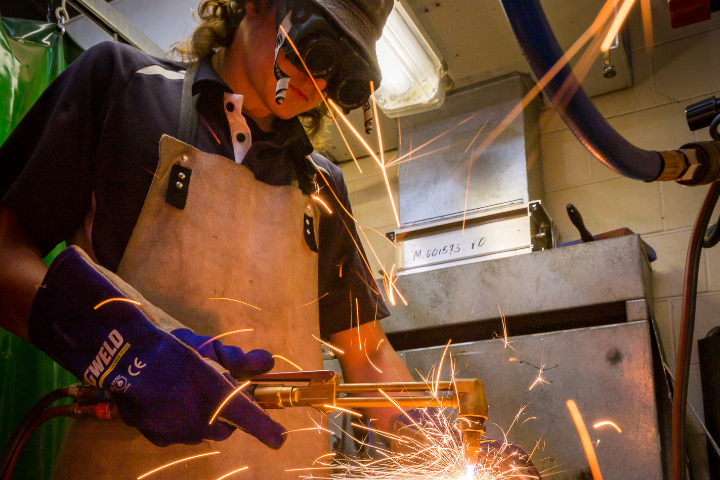
- Make practical tools that you can use and keep
- Design and make your own metal project
- Learn to use new tools and machinery
Subject Code: P3TML
Year Level: 9 or 10
What will I learn?
Utilising new skills, you make a series of set projects then design your own. You create a portfolio to help build skills as you progress in levels. We use power tools and machinery to achieve satisfying results. We look at the wide-spread use of different metals, and the environmental impact (mining) associated with obtaining them.
What will I do?
- Make hand tools that you can use and keep
- Design and make your own project
- Create and present a portfolio
Where can this take me?
Pathways: Metal – Carbon Steel, Metal – Wrought Iron.
VCE Subjects: VCE Product Design & Technology, VET Engineering.
Careers/Jobs: fitting and fabrication trades.
Duration:
1 semester.
Metal - Carbon Steel
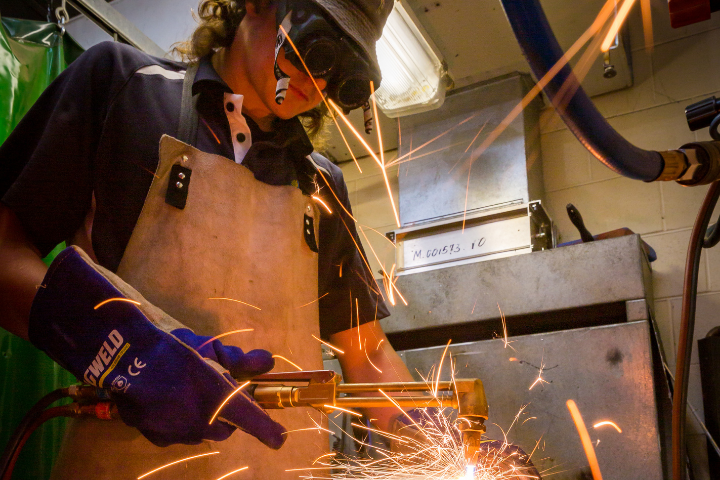
- Learn to use a wide range of machines from lathes and cut off machines
- Explore modern methods of metal production
- Design and craft a metal project that fulfils a user’s need
Subject Code: P3TMC
Year Level: 9 or 10
What will I learn?
Skills associated with machining and fabrication are available for you to learn and explore in depth, broadening your metalworking experience and understanding. Challenge yourself by designing a unique project that fulfils an end user’s need. We explore modern production methods and the use of computer aided machinery, along with sustainability concepts and how they apply to us as metalworkers.
What will I do?
- Make a folding shovel
- Design and create your own project
- Create a portfolio
Where can this take me?
Pathways: Metal – Alloy Steel, Metal – Wrought Iron.
VCE Subjects: VCE Product Design & Technology, VET Engineering.
Careers/Jobs: Fitting and fabrication trades.
Duration:
1 semester.
Metal - Wrought Iron
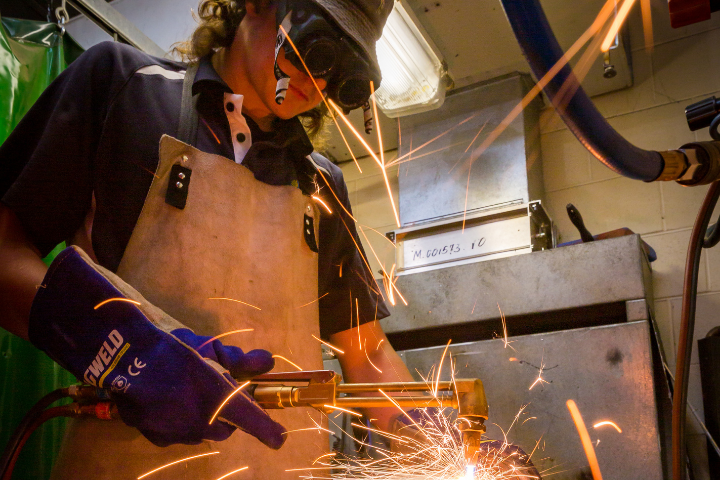
- Learn to shape, bend, cut and combine metal with a range of tools
- Incorporate modern and traditional methods of blacksmithing
- Familiarise yourself with sustainability concepts in the metal industry
Subject Code: P3TMW
Year Level: 9 or 10
What will I learn?
We take a more sophisticated approach to metalworking as you explore the possibilities of using metal in the making of unique items. Gain a deeper appreciation of metals as materials which are integral to our lives. Discover modern and traditional production methods used in blacksmithing such as forging and fabrication. Become familiar with sustainability concepts.
What will I do?
- Produce a project of your own design in Term 2 - such as a barbeque, fire pit or letter box and produce BBQ tools
- Use tools such as plasma cutters, welders and blacksmithing tools
- Use a variety of manufacturing techniques
Where can this take me?
Pathways: Metal – Alloy Steel, Metal – Carbon Steel.
VCE Subjects: VCE Product Design & Technology, VET Engineering.
Careers/Jobs: Fitting and fabrication trades.
Duration:
1 semester.
Systems - 3D Design and Construction
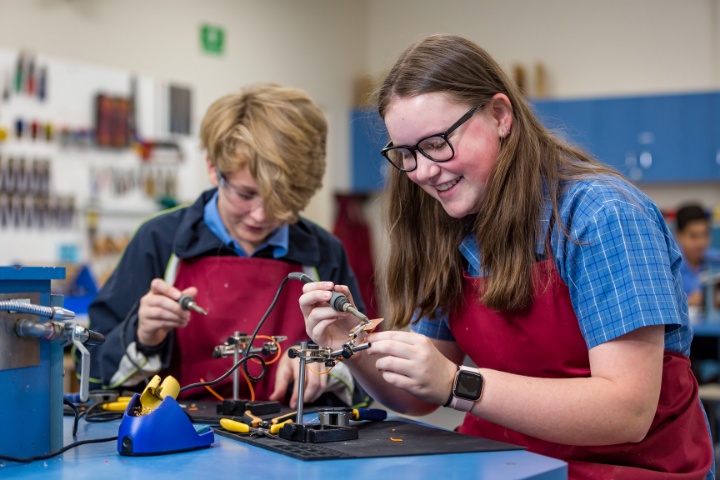
- Create CAD designs in TinkerCAD
- Learn how to solder, 3D print, circuit board production
- Design and Construction of your own project
Subject Code: P3TSC
Year Level: 9 or 10
What will I learn?
This is a practical hands-on class where you develop printed circuit boards and produce components to manufacture a completed electronics project. We conduct basic fault finding and testing and how to design and manufacture projects or components using CAD design and 3D printing. You look at energy generation, forces, safety, sustainability, as well as new and emerging technologies.
What will I do?
- Use simulated electronic designs and then reproduce them
- Make a shock box of your design using 3D printing
- Make a project of your own, using the skills you have learned
Where can this take me?
Pathways: Remote Controlled Vehicle, Robotics.
VCE Subjects: Further study in Systems Engineering. Metal Units 1-4. Wood Units 1-4. VET Engineering, Digital Technologies.
Careers/Jobs: Engineer, electrician.
Duration:
1 semester.
Systems - Remote Controlled Vehicle
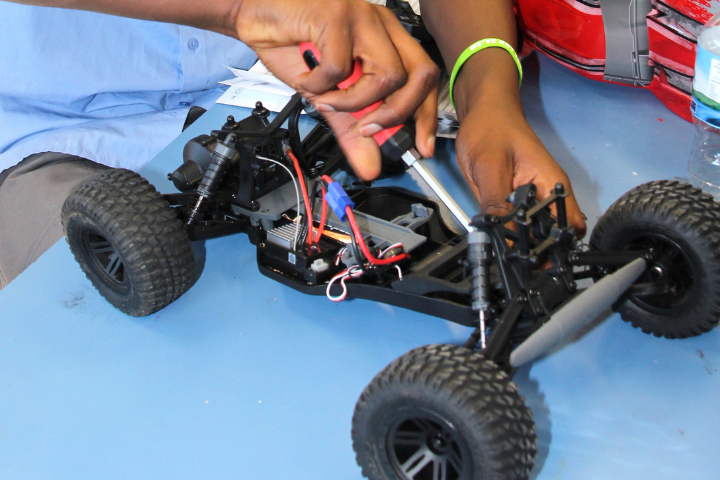
- Learn how to program using simulation software
- Create CAD designs and 3D Print
- Understand basic electronics, diagnostic testing and prototyping
Subject Code: P3TSV
Year Level: 9 or 10
What will I learn?
You program a microcontroller and how the microcontroller works in relation to a development board for a remote-controlled vehicle. We learn the theory of Ohm’s Law and how basic electronics components and circuits work in a system.
What will I do?
- Design and manufacture parts using CAD and 3D printing
- Use CAD software to design parts for your own remote-control vehicle
- Manufacture and construct a printed circuit board, vehicle chassis, gearbox
- Program the vehicle to follow remote instructions using the Arduino microcontroller or ESC receiver combo
- Run diagnostic tests and do prototyping
Where can this take me?
Pathways: 3D Design and Construction, Robotics.
VCE Subjects: Further study in Systems Engineering. Metal Units 1-4. Wood Units 1-4. VET Engineering. VET Creative Industries. Digital Technologies.
Careers/Jobs: Engineer, electrician.
Duration:
1 semester.
Systems - Robotics
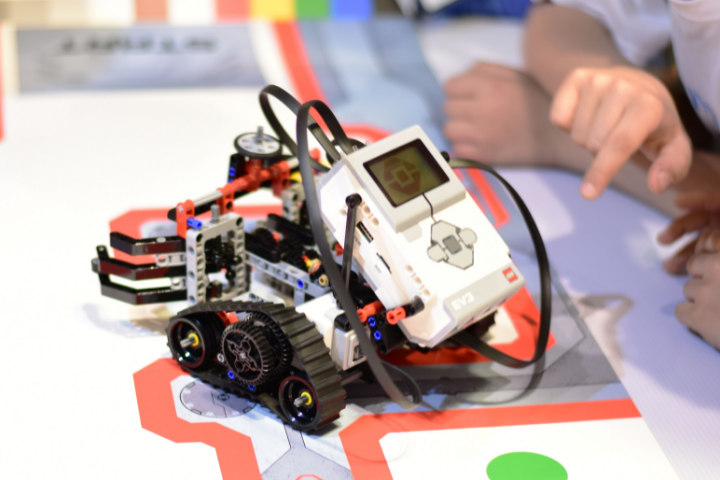
- Construct and program a VEX Robot
- Solve engineering problems through development and design
- Learn how to control a robot directly and autonomously
Subject Code: P3TSR
Year Level: 9 or 10
What will I learn?
We explore combinations of materials, forces, energy and motion in an engineered system. As a team, you learn how to design and build a mobile VEX robot to play a sport-like game. We look at key STEM principles, and robotics concepts. You design and manufacture parts using CAD and 3D printing, run diagnostic tests and do prototyping. At the culmination of this class, you compete head-to-head against your peers in the classroom.
What will I do?
- Construct the VEX robot and program it to follow instructions
- Using the VEX robot, redesign or modify it to solve an engineering problem
- Battle your robot head-to-head against peers in your classroom
Where can this take me?
Pathways: 3D Design and Construction, Robotics.
VCE Subjects: Further study in Systems Engineering. Digital Technologies. VET Creative Industries. VET Engineering.
Careers/Jobs: Engineer, electrician.
Duration:
1 semester.
Timber - Intermediate
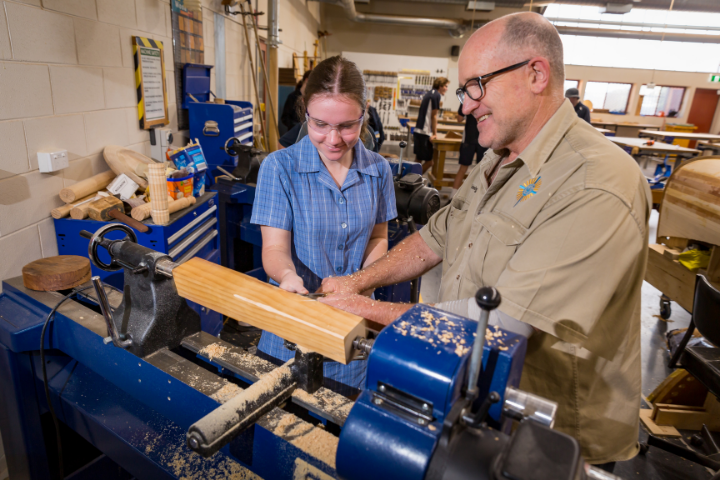
- Learn modern techniques
- Design and create your own exciting projects
- Use recently developed equipment
Subject Code: P3TTN
Year Level: 9 or 10
What will I learn?
In response to a design brief, students design a product that aligns with the specified constraints. As they navigate this process, students refine their skills in effectively communicating them through various sketches. Additionally, students explore the procedures required to produce their envisioned product, considering elements such as timber joinery techniques and material selection along with elements that can enhance the aesthetics of their final product. A key aspect of this project involves the responsible use of hand tools and workshop equipment, ensuring both safety and precision in the building process. Students document their designs in a portfolio demonstrating their creativity and technical ability to design, ideate, communicate, and bring their designs to life while following safety protocols and design stages..
What will I do?
- Three lessons each week, largely practical work
- Enjoy working with others, be creative
- Design and build personalised items - rolling pin
Where can this take me?
VCE Subjects: VCE Product Design & Technology, VET Engineering.
Careers/Jobs: This unit provides insights into careers in trades, and further study in design and manufacturing.
Duration:
1 semester.
Timber - Introduction
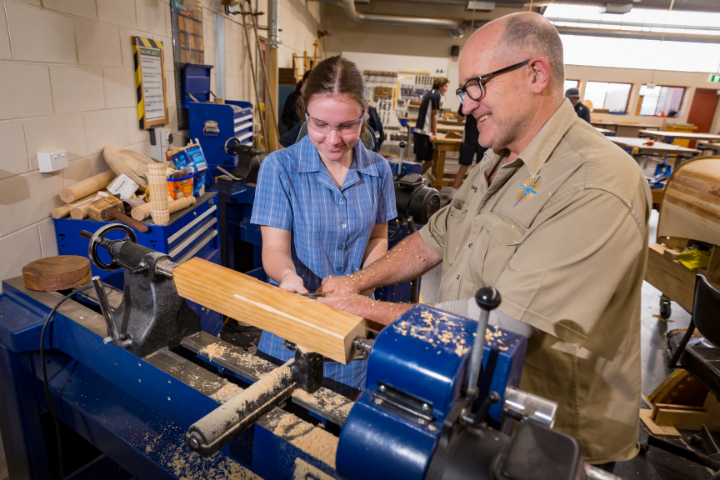
- An introduction to working with timber
- Learn to use a range of tools and machines
- Enjoy building creative projects
Subject Code: P3TTI
Year Level: 9 or 10
What will I learn?
In response to a design brief, students design a small occasional table that aligns with the specified constraints including an added secondary function. As they navigate this process, students refine their skills in effectively communicating them through various sketches. Students explore the procedures required to produce their final table, considering elements such as timber joinery techniques and material selection along with elements that can enhance the aesthetics of their final product. A key aspect of this project involves the responsible use of hand tools and workshop equipment, ensuring both safety and precision in the building process. Students document their designs in a portfolio demonstrating their creativity and technical ability to design, ideate, communicate, and bring their designs to life while following safety protocols and design stages.
What will I do?
- Three lessons each week, largely practical work
- Enjoy working with others, be creative. You use hand and power tools to design and build satisfying projects
- Make a breadboard, design brief project
Where can this take me?
Pathways: Timber – Intermediate.
VCE Subjects: VCE Product Design & Technology, VET Engineering.
Careers/Jobs: This unit provides insights into careers in trades, and further study in design and manufacturing.
Duration:
1 semester.
